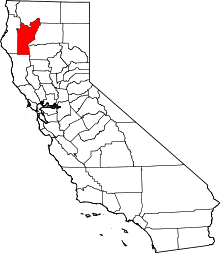Junction City, California
| Junction City | |
|---|---|
| census-designated place | |
 Junction City Position in California. | |
| Coordinates: 40°44′37″N 123°03′31″W / 40.74361°N 123.05861°WCoordinates: 40°44′37″N 123°03′31″W / 40.74361°N 123.05861°W | |
| Country |
|
| State |
|
| County | Trinity |
| Area[1] | |
| • Total | 27.949 sq mi (72.388 km2) |
| • Land | 27.904 sq mi (72.272 km2) |
| • Water | 0.045 sq mi (0.116 km2) 0.16% |
| Elevation[2] | 1,909 ft (582 m) |
| Population (2010) | |
| • Total | 680 |
| • Density | 24/sq mi (9.4/km2) |
| Time zone | Pacific (PST) (UTC-8) |
| • Summer (DST) | PDT (UTC-7) |
| ZIP Code | 96048 |
| Area code(s) | 530 |
| GNIS feature ID | 2583043 |
| U.S. Geological Survey Geographic Names Information System: Junction City, California | |
Junction City is a census-designated place (CDP) in Trinity County, California.[2] Junction City sits at an elevation of 1,909 feet (582 m).[2] Junction City is located 8 miles (13 km) west of Weaverville. The ZIP Code is 96048. The community is inside area code 530. The 2010 United States census reported Junction City's population was 680.
History
Junction City was established when a few cabins were built in the 1850s at the mouth of Canyon Creek, it was originally called "Milltown" due to the number of mills, but in 1861 it was officially named Junction City since it served as a junction for several transportation routes at Canyon Creek and Trinity River.
Junction City had the largest and most famous diversion dam. The Arkansas Dam,[3] was built in 1851, four miles upstream of Junction City. After the dam washed out in the winter of 1851 and again in 1852, it was rebuilt so substantially as to withstand not only the winter storms but also contain an upstream dam break flood that occurred when the 14-foot-high diversion dam at Union bar gave way.
The ensuing flood wiped out every water wheel, dam, and other structures along the river in the intervening 20 miles between the dams. In 1857, Arkansas dam was removed by the miners so they could reach the gold deposits beneath the dam.
In the May 8th, 2005 the hotel burned down under mysterious circumstances. It was one of the last remaining buildings in Junction City from the 1800s. In May 2006, the Junction Fire scorched 3,500 acres (14 km2), then later combined with the Bar Fire, making that 100,000 acres (400 km2). The Junction Fire threatened all of Junction City, and even some parts of the town of Weaverville.
On July 20, 2008 fire threatened communities near Junction City; some areas were under mandatory evacuation. Many huge forest fires broke out because of a lightning storm which occurred on June 20, 2008 in Northern California.
Geography
According to the United States Census Bureau, the CDP covers an area of 27.9 square miles (72.4 km²), 99.84% of it land and 0.16% of it water.
Demographics
The 2010 United States Census[4] reported that Junction City had a population of 680. The population density was 24.3 people per square mile (9.4/km²). The racial makeup of Junction City was 597 (87.8%) White, 1 (0.1%) African American, 29 (4.3%) Native American, 2 (0.3%) Asian, 0 (0.0%) Pacific Islander, 20 (2.9%) from other races, and 31 (4.6%) from two or more races. Hispanic or Latino of any race were 49 persons (7.2%).
The Census reported that 659 people (96.9% of the population) lived in households, 21 (3.1%) lived in non-institutionalized group quarters, and 0 (0%) were institutionalized.
There were 293 households, out of which 61 (20.8%) had children under the age of 18 living in them, 150 (51.2%) were opposite-sex married couples living together, 23 (7.8%) had a female householder with no husband present, 14 (4.8%) had a male householder with no wife present. There were 24 (8.2%) unmarried opposite-sex partnerships, and 0 (0%) same-sex married couples or partnerships. 86 households (29.4%) were made up of individuals and 26 (8.9%) had someone living alone who was 65 years of age or older. The average household size was 2.25. There were 187 families (63.8% of all households); the average family size was 2.71.
The population was spread out with 110 people (16.2%) under the age of 18, 36 people (5.3%) aged 18 to 24, 119 people (17.5%) aged 25 to 44, 261 people (38.4%) aged 45 to 64, and 154 people (22.6%) who were 65 years of age or older. The median age was 52.3 years. For every 100 females there were 100.6 males. For every 100 females age 18 and over, there were 101.4 males.
There were 361 housing units at an average density of 12.9 per square mile (5.0/km²), of which 236 (80.5%) were owner-occupied, and 57 (19.5%) were occupied by renters. The homeowner vacancy rate was 2.5%; the rental vacancy rate was 4.6%. 536 people (78.8% of the population) lived in owner-occupied housing units and 123 people (18.1%) lived in rental housing units.
Politics
In the state legislature, Junction City is in the 2nd Senate District, represented by Democrat Mike McGuire,[5] and the 2nd Assembly District, represented by Democrat Jim Wood.[6]
Federally, Junction City is in California's 2nd congressional district, represented by Democrat Jared Huffman.[7]
References
- ↑ U.S. Census
- 1 2 3 U.S. Geological Survey Geographic Names Information System: Junction City, California
- ↑ "Mining | VisitTrinity". visittrinity.com. Retrieved 2016-03-13.
- ↑ "2010 Census Interactive Population Search: CA - Junction City CDP". U.S. Census Bureau. Retrieved July 12, 2014.
- ↑ "Senators". State of California. Retrieved March 10, 2013.
- ↑ "Members Assembly". State of California. Retrieved March 2, 2013.
- ↑ "California's 2nd Congressional District - Representatives & District Map". Civic Impulse, LLC. Retrieved March 1, 2013.
